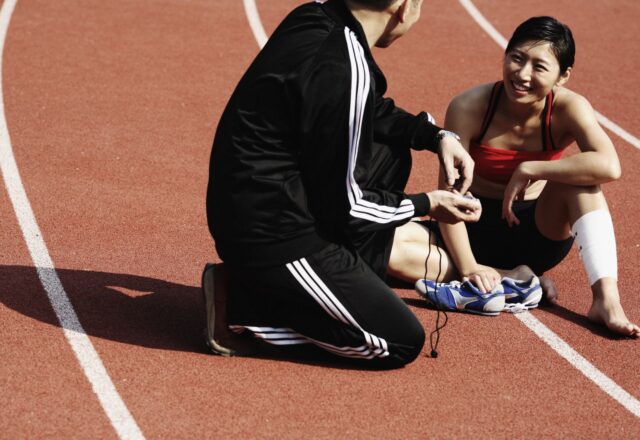Sports psychology is a relatively recent area that views sports in terms of psychological and emotional aspects of athletic performance. It deals with understanding how psychological factors interact with sports performance and utilizing such knowledge to assist athletes in developing mental toughness, motivation, and enhancing general performance. With increasing competitiveness in sports, the psychology of sports becomes more recognized as an integral part of training for all levels of amateur and professional athletes alike.
Sports Psychology Explained
Sports psychology will help in understanding the different mental processes and behaviors which occur to affect an athlete’s performance. Several aspects were studied, including motivation, confidence, concentration, stress management, and goal setting. Sports psychologists address these mental aspects of activity so that athletes acquire the mental capacity to perform under pressure, recover from blunders, maintain focus, and develop composure.
Sports psychologists help them develop mental skills and strategies to complement the physical training that athletes get. Some common techniques used in building mental strength and fortifying one’s will to perform better include visualization, self-talk, relaxation, and mindfulness.
The Role of Mental Toughness
It is an important attribute in sports, giving athletes the capacity for dealing with pressure, handling concentration, and persevering through difficult situations. Characterized by maintaining a positive attitude, staying motivated, and bouncing back from failure, it is what sports psychologists do with athletes to develop mental toughness—assist them in building the kind of resilience that will make them successful in competitive environments.
For example, if towards the end of the game, with only seconds left to play and the game at a good point, the athlete maintains his calm and composure, he has mental toughness. This attribute helps in maintaining high performance even under highly pressurized situations.
Development of higher motivation and confidence
Motivation is a key determinant of athletic performance. It is responsible for how much an athlete dedicates to training, how well they suffer through pain and fatigue, and even how resilient they are under defeat. In such situations, a sports psychologist shall help these athletes understand what really drives them: whether it is an intrinsic factor, such as personal satisfaction and growth, or extrinsic variables, such as rewards and recognition.
Confidence is also one of the most important factors in sports. The difference in the level of self-belief can make all the difference in the performance of an athlete. Sports psychologists assist athletes in generating self-confidence through positive reinforcement, setting attainable goals, and focusing on strengths rather than weaknesses.
Management of Stress and Anxiety
Sports can be pretty stressful, most especially at higher competitive levels. It is observed that most of these athletes are pressured by themselves, coaches, fellow teammates, and fans to perform. Sports psychology provides ways to cope with stress and anxiety to avoid such impacts on performance.
They help athletes, through techniques such as deep breathing, progressive muscle relaxation, and mindfulness meditation, to keep composed under pressure. In this way, they are able to learn the control of these physiological responses to stress—like tachycardia and muscle tension—with a composure that allows for the best possible performance.
Goal Setting and Performance Enhancement
Goal setting in sports psychology helps athletes by providing direction and clear objectives. The setting of SMART goals helps athletes focus on the progress and remain motivated.
Sports psychologists help athletes break down long-term goals into small, manageable tasks, which allow them to take a structured approach toward their improvement process. This enables an athlete to trace progress and get small wins in between, which, in turn, help to stay motivated and confident and therefore improve performance as a whole.
Visualization and Mental Imagery
It is the technique of sports psychology used to enhance performance, whereby an athlete envisions him- or herself performing a certain skill or task execution. It’s like mentally rehearsing, whereby one pictures or imagines within his mind the result he desires. This practice helps the athlete prepare his mind towards competition, build confidence, and enhance his technique.
Studies have been conducted on how visualization can affect the enhancement of motor skills and performance. When athletes visualize specific movements, they’re engaging the same neural pathways as when they physically do the action. That reinforces muscle memory and enhances the quality of execution in actual competition.
Building Team Cohesion and Communication
This also assists in the development of team unity and communication for those participating in team sports. Interpersonal relationships, culture of the team, and communication are worked on by sports psychologists with teams. Effective communication, trust, and unity are indispensible in succeeding, especially during high-pressure situations, within a team.
By setting team goals, encouraging mutual respect, and resolving conflicts, sports psychologists help the teams function as cohesive units, hence performing better and achieving better results.
Conclusion
It is within the context of ultra-modern athletic training that sports psychology has become an integral part of athletic performance: dealing with the psychological perspectives that define perfect performance. Creating mental toughness, enhancing motivation and confidence, managing stress, and other techniques like visualization may help an athlete realize his full potential. As the field keeps expanding, sports psychology will continue to remain one of the essential tools for athletes eyeing a competitive advantage and supremacy in their respective sports.








